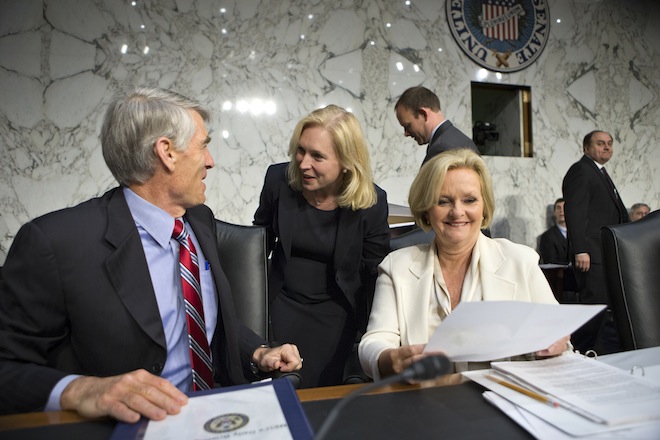The politically explosive issue of how to stem sexual assault in the military is dividing senators and reform advocates, creating strange bedfellows and pitting two Democratic women on the Senate Armed Services Committee against each other.
One side is led by Sen. Claire McCaskill (D-MO), whose proposal would keep the issue of sexual assault within the military chain of command, despite its notoriously poor record in dealing with the problem, but require civilian review of cases that the military brass declines to prosecute.
Her plan, backed by Armed Services Chairman Carl Levin (D-MI) and others such as Sens. Kelly Ayotte (R-NH) and Jon Tester (D-MT), passed 17-9 in committee last month. Its supporters embrace the need for reform but echo Pentagon fears that it would undermine military commanders to strip them of authority on the matter.
The other side is led by Sen. Kirsten Gillibrand (D-NY), whose competing plan would remove sexual assault (and other serious crimes that aren’t unique to the military) from the chain of command, over the objections of the defense establishment, and set up an independent prosecutor’s office to deal with cases like rape.
Gillibrand’s plan is supported by an ideologically diverse group ranging from Sen. Michael Bennett (D-CO) to Sens. Rand Paul (R-KY) and Ted Cruz (R-TX). Her office counts 44 backers, including eight Republicans, and says that number will grow. She intends to offer it as an amendment to the defense authorization bill when it comes up this fall.
Publicly, the two Democratic women have remained cordial as they talk up their respective plans, and attribute their differences to honest disagreements. But behind the scenes, the battle is getting testy as outside advocates are jumping in the fray to take sides. One advocacy group for military rape victims, Protect Our Defenders, stunned McCaskill by attacking her in an ad for opposing the Gillibrand plan, despite the Missourian’s advocacy for rape victims.
An estimated 26,000 instances of unwanted sexual contact occurred in the military in 2012, of which just 3,000 were reported, according to the Department of Defense. Just 302 of those cases went to trial and 238 subjects were convicted.
Supporters of Gillibrand’s plan argue the existing system is broken and that requiring civilian review of cases that aren’t prosecuted isn’t enough. The big problem, they say, citing victims advocates, is that the chain of command encourages victims to keep quiet.
“Every secretary of defense going back to Dick Cheney has said the words ‘we have zero tolerance for sexual assault in the military.’ The military has had over 20 years to solve this problem and they have failed,” said Gillibrand spokesman Glen Caplin. “The problem that the [McCaskill and] Levin alternative is trying to solve is not the problem. The problem is a lack of reporting. … Victims themselves have said the chain of command has a chilling effect on the willingness to report sexual assault.”
McCaskill’s spokesman John LaBombard said that as a former prosecutor who has “prosecuted dozens, if not hundreds, of sex crimes,” the senator believes her plan creates the right system of checks and balances. “Claire believes it strikes the strongest possible balance to protect the victim and put perpetrators behind bars,” he said. He argued that keeping the issue within the chain of command would better protect victims from retaliation by fellow service members.
“There’s a greater risk of retaliation against victims if it’s an outside group that deals with this,” he said. “The commanders will always carry more gravitas and legitimacy than a group of outside lawyers, and that won’t be there if we take commanders out of the process. … We also don’t want to create an environment where the commanders can just wash their hands of the problem and the responsibility.”
McCaskill and Gillibrand are poised to spend the August recess battling it out because the National Defense Authorization Act is unlikely to reach the Senate floor until September.
LaBombard stressed that despite the senators’ disagreements on this issue, McCaskill and Gillibrand agree on the vast majority of reforms to stem sexual assault that are poised to pass, and will be “joined at the hip” moving forward no matter whose plan wins the day.






